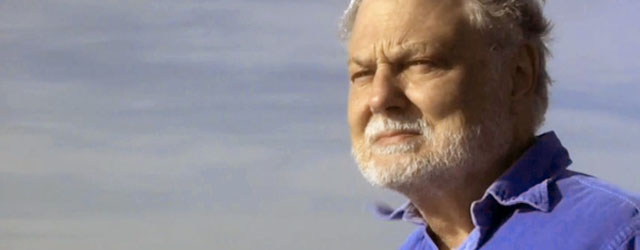Vincent and Duane Elgin:
Simplicity, Consumption, Community, and Work
Contemporary author and visionary, Duane Elgin‘s book, Voluntary Simplicity, first published in 1981, has been revised and updated in a publication released in January 2010. His other books include The Living Universe, Promise Ahead, and Awakening Earth.
Elgin suggests that simplicity is about eliminating the need for possessions by living “directly in touch with life.” He writes:
It is when we remove ourselves from direct and wholehearted participation in life that emptiness and boredom creep in. It is then that we begin our search for something or someone that will alleviate our gnawing dissatisfaction. Yet the search is endless to the extent that we are continually led away from ourselves and our experience in the moment. (1993. 145-156)
Living life directly, and not through material possessions or deceptions, also allows us to be more authentic, a quality which many people desire in leadership.  Elgin says simplicity invites us to live fully open in the moment “to the learning and love that life offers.” Such an approach to simplicity is “not self-denying but life-affirming.”
Elgin says simplicity invites us to live fully open in the moment “to the learning and love that life offers.” Such an approach to simplicity is “not self-denying but life-affirming.”
Benefit of Living Simply
The benefit of living this approach to simplicity is two-fold. On the one hand, we feel less need for material things to meet our needs for well being. Lived with simple, direct intention, our lives become richer, more varied, more pleasurable, more meaningful and genuine. We become more in touch with who we really are. “Our lives become clearer, more direct, less pretentious, less complicated.” At the same time, as we come to consume less material goods, we place less demand on Earth’s limited resources.
Elgin links simplicity with integration and wholeness. Living simply and directly allows us to live each moment with conscious intention. This intention and attention with every activity helps us to grow in awareness of how the various “pieces” of our lives – labor, prayer, community, leisure, reflection – all link together and reinforce one another.
How can we make simplicity one of our guiding virtues today? In his book, Elgin offers a look at how simplicity might operate in our choices around consumption, communication, and in the workplace.
Simplicity and Consumption
 When it comes to thinking about our patterns of consumption, Elgin makes it clear that simplicity is not about choosing extreme poverty, but about finding a balance between the extremes of poverty and excess. Elgin shifts the focus from self-denial to self-fulfillment. “Simplicity is a double-edged sword in this regard: living with either too little or too much will diminish our capacity to realize our potentials. Bringing simplicity into our lives requires that we discover the ways in which our consumption either supports or entangles our existence…. If we are totally absorbed in the struggle for subsistence or, conversely, if we are totally absorbed in the struggle to accumulate, then our capacity to participate wholeheartedly and enthusiastically in life is diminished.”
When it comes to thinking about our patterns of consumption, Elgin makes it clear that simplicity is not about choosing extreme poverty, but about finding a balance between the extremes of poverty and excess. Elgin shifts the focus from self-denial to self-fulfillment. “Simplicity is a double-edged sword in this regard: living with either too little or too much will diminish our capacity to realize our potentials. Bringing simplicity into our lives requires that we discover the ways in which our consumption either supports or entangles our existence…. If we are totally absorbed in the struggle for subsistence or, conversely, if we are totally absorbed in the struggle to accumulate, then our capacity to participate wholeheartedly and enthusiastically in life is diminished.”
Elgin also warns against “identity consumption.” He cautions:
When we believe the advertiser’s fiction that ‘you are what you consume,’ we begin a misdirected search for a satisfying experience of identity. We look beyond ourselves for the next thing that will make us happy: a new car, a new wardrobe, a new job, a new hairstyle, a new house, and so on. Instead of lasting satisfaction, we find only temporary gratification. (149).
Finding a balance between poverty and excess, and avoiding identity consumption requires coming to recognize for ourselves the difference between what we need and what we want. It requires a commitment to truthful living, as admonished by Vincent in his own commitment to simplicity. It is easy to get caught in the cycle of seeking what we want in order to avoid confronting the truth of our present reality. Radical simplicity invites us to find lasting happiness in our true identity and vocation, affirming the natural beauty and dignity of every aspect of who we truly are in the present moment.
Simplicity and Communication
When we apply the principle of simplicity to our communication, we will be more direct, clear, and honest. This, Elgin suggests, has several benefits. First, the more direct, clear, and honest we are in our communications, the more we engender trust on the part of others. Greater trust leads to more openness to cooperation and collaboration; a side benefit of which is reduced effort and consumption.
Clearer more direct communication also leads to better, more productive use of time. Less time is “wasted” by communication that is irrelevant or confusing, contributing to speculation, office gossip, or repeat messages.
Elgin also suggests that we can sharpen the focus of our communication by inviting more silence into our meetings and conversations. “Once we are comfortable in allowing silence its place in communication, there is the opportunity to express ourselves more fully and authentically. The simplicity of silence fosters dignity, depth, and directness in communication.”
Greater trust and collaboration, more productivity, and a sharpened focus are just three of the benefits that Elgin says come from applying the virtue of simplicity to our communication.
Simplicity at Work
As mentioned in the above introduction, Elgin suggests that simplicity implies living more directly and intentionally. This carries over into our work. When we apply the virtue of simplicity to work, we come closer to an approach to our work that involves service and satisfaction. We work not to afford a better lifestyle, but to contribute to the well-being of ourselves and others. “In sensing and responding to the needs of the world, our work acquires a natural focus and intention that brings clarity and satisfaction into our lives.”
 Another dimension of simplicity in the workplace, says Elgin, is exhibited “in more human-sized places of employment.” Industrialization has led to huge corporations, educational institutions, and medical complexes, in which workers feel lost and insignificant. Elgin does not call for the abandonment of institutions, but for redesigning them, creating comprehensible size and manageable complexity. “By consciously creating workplaces of a size that encourages meaningful involvement and personal responsibility, the rampant alienation, boredom, and emptiness of work would be greatly reduced.”
Another dimension of simplicity in the workplace, says Elgin, is exhibited “in more human-sized places of employment.” Industrialization has led to huge corporations, educational institutions, and medical complexes, in which workers feel lost and insignificant. Elgin does not call for the abandonment of institutions, but for redesigning them, creating comprehensible size and manageable complexity. “By consciously creating workplaces of a size that encourages meaningful involvement and personal responsibility, the rampant alienation, boredom, and emptiness of work would be greatly reduced.”
Yet another way the clarity and directness of simplicity can be expressed in the workplace is through more direct and meaningful participation by employees in decisions about work. Examples given by Elgin are: direct participation in decisions about products and services, direct involvement in organizing the work process, and direction participation in deciding the structure of work arrangements (flexible hours, job sharing, job swapping, teamwork, etc.).
Vincent on Simplicity
Vincent de Paul encouraged his companions in mission to cultivate five virtues: simplicity, humility, meekness, mortification and zeal. The first, simplicity, he described as “my gospel.”
![]() Vincent would have agreed with Duane Elgin that simplicity is important to authentic leadership. Robert P. Maloney, C.M., in his own contemporary visioning of Vincent’s virtue of simplicity, writes: “People spontaneously admire those who live out what they believe and say.” Maloney suggests that Vincent understood the importance of speaking the truth and avoiding duplicity at all times as a leader.
Vincent would have agreed with Duane Elgin that simplicity is important to authentic leadership. Robert P. Maloney, C.M., in his own contemporary visioning of Vincent’s virtue of simplicity, writes: “People spontaneously admire those who live out what they believe and say.” Maloney suggests that Vincent understood the importance of speaking the truth and avoiding duplicity at all times as a leader.
Putting our focus on these three areas – consumption, communication, and work – can offer opportunities to put Vincent’s virtue of simplicity into practice with real benefits in our daily lives.
Reflection Questions:
How well do I know the difference between my needs and wants?
What indicators for me evidence a balance in my life between poverty and excess?
Do I own things, or do things own me?
How clear and direct am I in my communication?
Do I say all that I mean? Do I mean all that I say?
Do I use Email effectively? Do I consider another’s time in sending Emails and when expecting a response? Could I save us both time with simpler, more direct communication?
Are there ways to trim our organizational excess? Reduce our complexity?
How might I invite more direct participation in decision?
Resources
Elgin, Duane. Voluntary Simplicity: Toward A Way Of Life That Is Outwardly Simple, Inwardly Rich, New York: Quill/Harper Collins, 1993.
Robert P. Maloney, C.M., The Way of Vincent de Paul: A Contemporary Spirituality in the Service of the Poor. Hyde Park, NY: New City Press. 1992. 53-56
Edited by Patricia M. Bombard, BVM, D.Min., Director, Vincent on Leadership: The Hay Project, DePaul University, Chicago, IL USA



